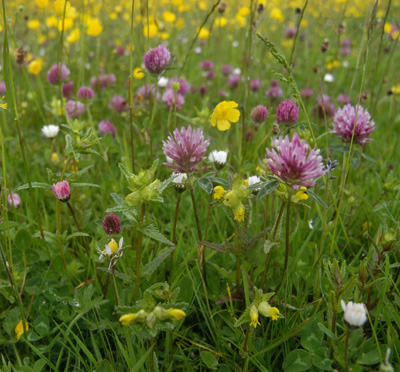Parasites promote biodiversity
Parasitic plants can improve the biodiversity and fertility of ecosystems, according to a new paper published in Nature this month (23 February, 2006).

Parasitic Plants are those which derive their nutrients from other living plants by either attaching themselves to the tissues of other living plants or living entirely within them.
Because they deprive their host plants of valuable nutrients and energy they often cause their host plant to decline or even die.
But new research by Professor Richard Bardgett of Lancaster University, in collaboration with colleagues at Newcastle University and the Institute of Grassland and Environmental Research, shows that some varieties of parasitic plants have marked beneficial effects on plant diversity and soil fertility.
The paper - Parasitic plants indirectly regulate below ground properties in grassland ecosystems – explains how a parasitic plant ‘Rhinanthus minor’, which is widespread in grasslands of Europe and North America, has a strong effect on plant communities and the soils that underlie them.
Rhinanthus minor, commonly known as yellow-rattle, lives on the roots of fast-growing grasses in low to medium fertility grasslands, reducing their competitive dominance and therefore enabling other plant species, such as flowering herbs, to flourish. The overall effect of this is an increase in plant diversity in grassland.
The research also showed that Rhinanthus minor had a marked effect on the soil, increasing the activity of microbes that live in it and increasing rates of nitrogen cycling, which is an important aspect of soil fertility and plant nutrition.
Professor Richard Bardgett said: “Parasitic plants are normally thought of as being harmful, but our results show that they can strong positive effects on the biodiversity and fertility of grasslands. Our findings suggest that parasitic plants might be used to restore plant diversity in grasslands. Given that there are more than 3,000 species of parasitic plants worldwide, they also suggest that this group of plants might have important, but until now hidden, effects on the dynamics of other ecosystems.”
Nature is a weekly international journal publishing the finest peer-reviewed research in all fields of science and technology. It is considered to be the world's top multidisciplinary science journal.
The authors of the paper are Richard D. Bardgett, Roger S. Smith, Robert S. Shiel, Simon Peacock, Janet M. Simkin, Helen Quirk & Phil J. Hobbs.
The work was funded by DEFRA. Richard Bardgett is Professor of Ecology in the Department of Biological Sciences, Lancaster University.